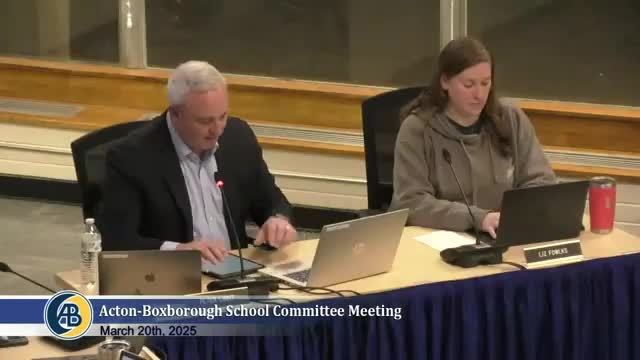Acton-Boxborough Regional School Committee adopts $116.79 million budget; Acton, Boxborough assessments rise
Get AI-powered insights, summaries, and transcripts
Subscribe
Summary
The Acton-Boxborough Regional School Committee voted unanimously to approve a $116,791,164 fiscal‑year 2026 budget and set town assessments; committee members said the plan preserves essential services but acknowledged it cuts programs and will strain future years without new revenue.
The Acton-Boxborough Regional School Committee on March 20 approved a $116,791,164 budget for fiscal year 2026 and set the district assessments to Acton and Boxborough, measures committee members said protect core services this year but will leave the district vulnerable if funding does not improve.
The approved budget totals $116,791,164 and was presented by Superintendent Peter Light as the final budget the committee would send to the two member towns for their annual town meetings. Peter Light said the district’s base budget will rise 2.11% over the current year; the proposed assessment to Acton is about $79,959,269 (a 1.12% increase) and to Boxborough about $16,824,370 (a 5.41% increase). The budget includes estimates of state and other receipts and a list of anticipated offsets spelled out in the motion the committee approved.
Why it matters: Committee members repeatedly framed the vote as unavoidable given declining enrollment and rising costs. Several members said the district has exhausted efficiency options and that the current package reduces services that affect high‑need students. Committee members and administrators warned that without new ongoing revenue sources, similar cuts could be required again in future years.
Light told the committee enrollment has declined in recent years and is projected to fall further over the next eight years. He said the district has adjusted staffing roughly in proportion to enrollment declines but has increased some support positions because the share of students classified as high‑needs has grown from about one quarter to roughly one third of students, driving the need for specialized staff.
Light and other speakers outlined structural budget changes and one‑time adjustments that shaped the package, including health insurance moves that reduced the projected impact on the budget and savings from attrition. He also noted the final debt payment for the junior/senior high school project was this year, reducing the district’s base budget and town revenues by about $1.6 million next year.
School Committee members who spoke during debate urged early, broad community engagement and repeated that last year’s override reduced the scale of cuts this year. Committee member Tory said the override bought time but warned ‘‘we can’t do this again’’ and recommended the community prepare for longer‑term funding choices. Member Leila and others said the budget forces reductions that hit students with the greatest needs and reduces supports such as elementary assistance, tiered math and reading interventions, and multilingual services.
The motion adopted by the committee specified the budget amount and listed anticipated receipts, including Chapter 78 aid of $16,829,871, state transportation aid of $2,514,639, charter school aid of $139,515, Medicaid reimbursement of $200,000, and other anticipated revenues and transfers; the motion set the net assessments to the two towns in accordance with the regional agreement. School Committee member Rebecca made the motion and Tory seconded it; the vote was unanimous.
The committee discussed contingencies and the district’s RFP timeline for consultant work on reorganization, noting that if some planned one‑time expenditures come in below estimate there may be limited opportunities to reallocate funds. Peter Light cautioned that some of the additional funds included in next year’s budget are one‑time and not guaranteed going forward.
What’s next: The committee will present the adopted budget and assessments at the Acton town meeting on May 5 and the Boxborough town meeting on May 12. Several members urged earlier outreach to town finance committees and select boards to prepare voters for the assessment impacts and to discuss longer‑term revenue options.
Ending: Committee members closed debate by thanking staff for developing the budget under tight constraints and reaffirming that the committee will continue advocacy with state legislators and local leaders to seek sustained funding improvements for the district.
